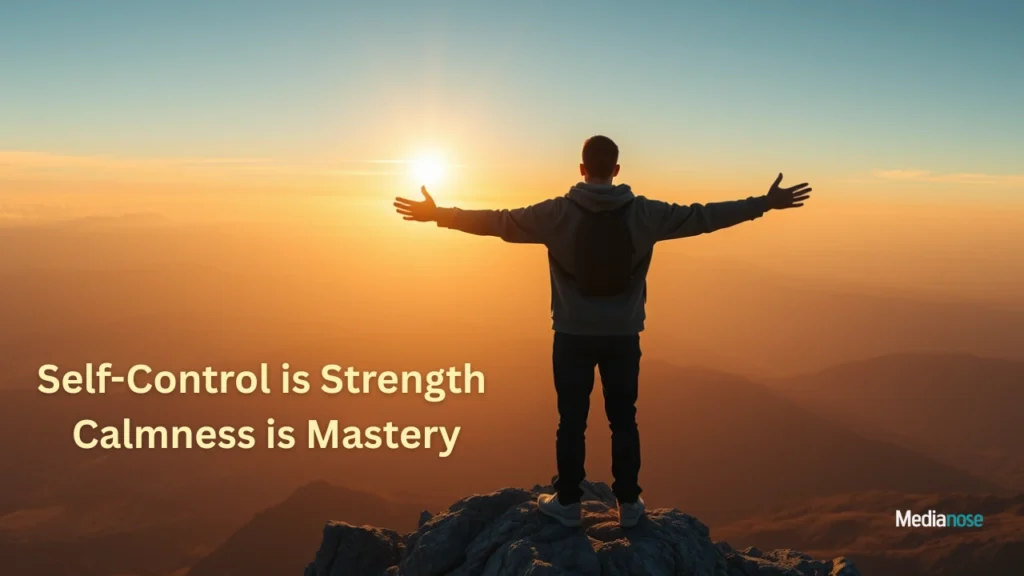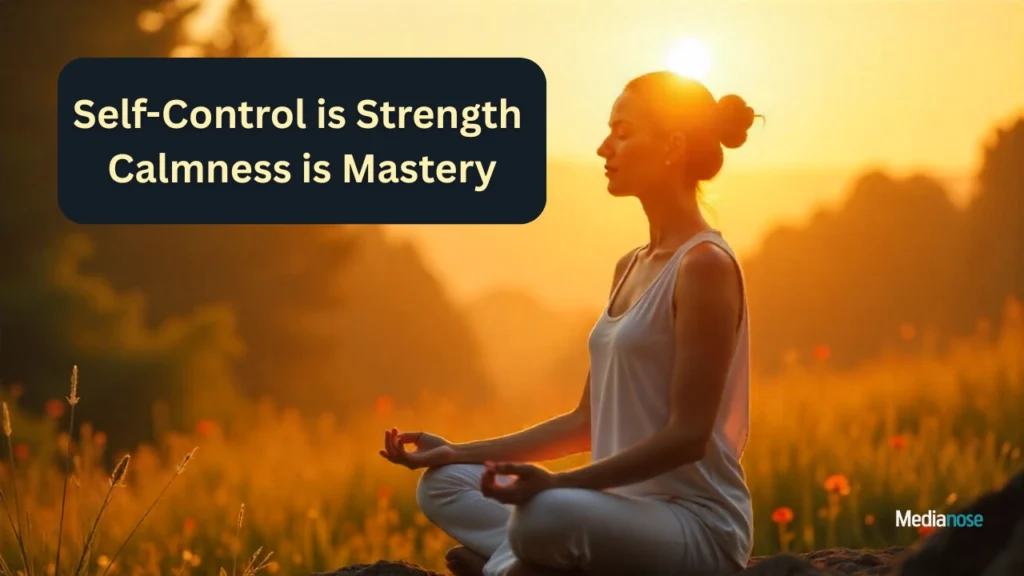Life constantly tests us with challenges, emotions, and distractions. Many thinkers, writers, and leaders have reminded us that our ability to remain steady in difficult times defines who we are. The phrase “self-control is strength. calmness is mastery. you – tymoff” beautifully captures this wisdom in simple words. It speaks about the quiet power of discipline, patience, and composure that shape our character and guide us toward a more balanced life.
What Does “Self-Control is Strength. Calmness is Mastery. You – Tymoff” Really Mean?
The words look simple at first glance, but they carry layers of meaning that apply to both personal and professional life. Self-control means being able to manage your impulses, reactions, and desires. It’s about choosing long-term peace over short-term pleasure. Calmness, on the other hand, is the art of keeping your emotions balanced even when life feels overwhelming.
The phrase “self-control is strength. calmness is mastery. you – tymoff” is not just about personality; it’s about personal growth. Strength does not always mean physical power. It means inner power—the ability to resist anger, avoid harmful choices, and stay focused on what truly matters. Mastery is not about controlling others but mastering yourself.
Imagine being in an argument where the other person raises their voice. Your strength lies in not reacting with anger. Your mastery lies in keeping calm and responding wisely. This is the difference between living as a reactor of situations versus living as a master of them.
Also Read
Key insights
- Self-control makes you stronger than challenges
- Calmness allows you to master situations, not be mastered by them
- You, the individual, are responsible for cultivating both qualities
Why Self-Control is the True Definition of Strength

Many people mistake strength for aggression or dominance, but real strength lies in restraint. Self-control is about the ability to manage impulses, emotions, and habits even when external pressures push you to act otherwise. It is the power to pause, reflect, and choose a response that aligns with your values and long-term goals.
Self-control is not just a personal skill—it affects every part of life. Maintaining discipline in your work, finances, or health routines shows strength that is sustainable and meaningful. Even simple acts, like resisting a harsh reply during a heated conversation, demonstrate more power than physical aggression ever could.
Benefits of Self-Control
- Helps resist short-term temptations in favor of long-term success
- Reduces stress and anxiety by promoting thoughtful responses
- Improves decision-making and prevents regretful actions
- Strengthens relationships through patience and understanding
When you remember “self-control is strength. calmness is mastery. you – tymoff,” it becomes clear that your inner discipline shapes the outcomes you experience. By practicing self-control consistently, you build resilience and confidence that no external circumstance can shake.
Calmness is Mastery: Understanding Emotional Balance
While strength comes from self-control, mastery comes from calmness. Calmness is not about suppressing emotions; it’s about managing them so they don’t control you. A calm mind sees situations clearly, identifies the best course of action, and acts with purpose rather than reaction.
Mastery through calmness is vital in today’s hectic world. People who respond calmly under stress are often more effective, respected, and influential. This is because calmness communicates confidence, clarity, and emotional intelligence. The phrase “self-control is strength. calmness is mastery. you – tymoff” reminds us that true mastery is internal—it begins with the ability to stay composed even when everything around us is chaotic.
How Calmness Improves Your Life
- Encourages thoughtful decision-making rather than impulsive choices
- Reduces the negative effects of stress on mental and physical health
- Enhances personal and professional relationships by fostering understanding
- Builds trust and credibility, as calm people are seen as reliable and wise
Practical Ways to Cultivate Self-Control and Calmness

Developing self-control and calmness is a skill that requires practice, patience, and awareness. Here are actionable steps you can start implementing today:
Daily Practices
- Mindful Breathing: Spend 5–10 minutes focusing on your breath to center yourself
- Pause Before Reacting: Count to ten or take a brief walk before responding to difficult situations
- Set Clear Goals: Structure your day to minimize impulsive decisions
- Reflect on Emotions: Journaling your feelings helps recognize triggers and patterns
- Limit Distractions: Reduce overuse of social media or multitasking that weakens self-control
Long-Term Strategies
- Meditation and Mindfulness: Regular practice strengthens emotional regulation
- Exercise and Nutrition: Physical health directly affects your mental resilience
- Positive Affirmations: Repeat phrases like “self-control is strength. calmness is mastery. you – tymoff” to reinforce inner discipline
- Learn from Role Models: Observe how disciplined and calm individuals handle challenges
Consistency in these practices gradually transforms your mindset. Over time, challenges will no longer feel overwhelming, because your calm and controlled response becomes habitual.
The Science Behind Self-Control and Calmness
Research shows that self-control is linked to the prefrontal cortex, the part of the brain responsible for decision-making, impulse control, and emotional regulation. Practicing self-control exercises, like delaying gratification, strengthens neural pathways associated with self-discipline.
Calmness is also supported by neuroscience. Mindfulness and meditation reduce activity in the amygdala, the brain’s center for stress and fear, while increasing connectivity in areas that support attention and emotional regulation. Essentially, you are training your brain to respond thoughtfully rather than react impulsively.
| Trait | Brain Area | Benefit |
|---|---|---|
| Self-Control | Prefrontal Cortex | Improved decision-making, reduced impulsivity |
| Calmness | Amygdala Regulation | Reduced stress, better emotional balance |
This table highlights how both self-control and calmness are not just philosophical ideals—they are measurable, trainable skills that directly improve your brain function and life outcomes.
How “Self-Control is Strength. Calmness is Mastery. You – Tymoff” Applies Daily
Applying this phrase in daily life transforms ordinary routines into opportunities for personal growth:
- Workplace: Handle criticism calmly, manage deadlines without panic, and lead by example
- Relationships: Avoid reactive arguments, listen attentively, and respond thoughtfully
- Personal Growth: Resist harmful habits, set realistic goals, and celebrate small victories
By living with this mindset, your choices become more intentional, your relationships stronger, and your overall quality of life better. Remember, strength and mastery are not external trophies—they are the inner states that allow you to navigate life gracefully.
FAQs
Q1: How can I remind myself to practice self-control daily?
You can use small cues like sticky notes, phone reminders, or repeating the phrase “self-control is strength. calmness is mastery. you – tymoff” each morning to reinforce your mindset.
Q2: Is calmness the same as being passive?
No, calmness is about control and clarity, not passivity. It allows you to respond effectively rather than react impulsively.
Q3: How long does it take to develop self-control and calmness?
With consistent practice, small improvements can be seen in a few weeks, but mastery is an ongoing journey. Daily mindfulness, reflection, and self-discipline accelerate growth.
Q4: Can children learn self-control and calmness too?
Absolutely. Introducing mindful habits, emotional regulation exercises, and consistent routines helps children develop these skills early.
Conclusion
The wisdom in “self-control is strength. calmness is mastery. you – tymoff” is timeless. It reminds us that true power comes from managing ourselves, not controlling others. By cultivating self-control, you gain inner strength, and by embracing calmness, you achieve mastery over your life. These qualities together shape resilient, confident, and purposeful individuals. Start small, practice daily, and watch how life changes when strength and calmness guide your choices.





